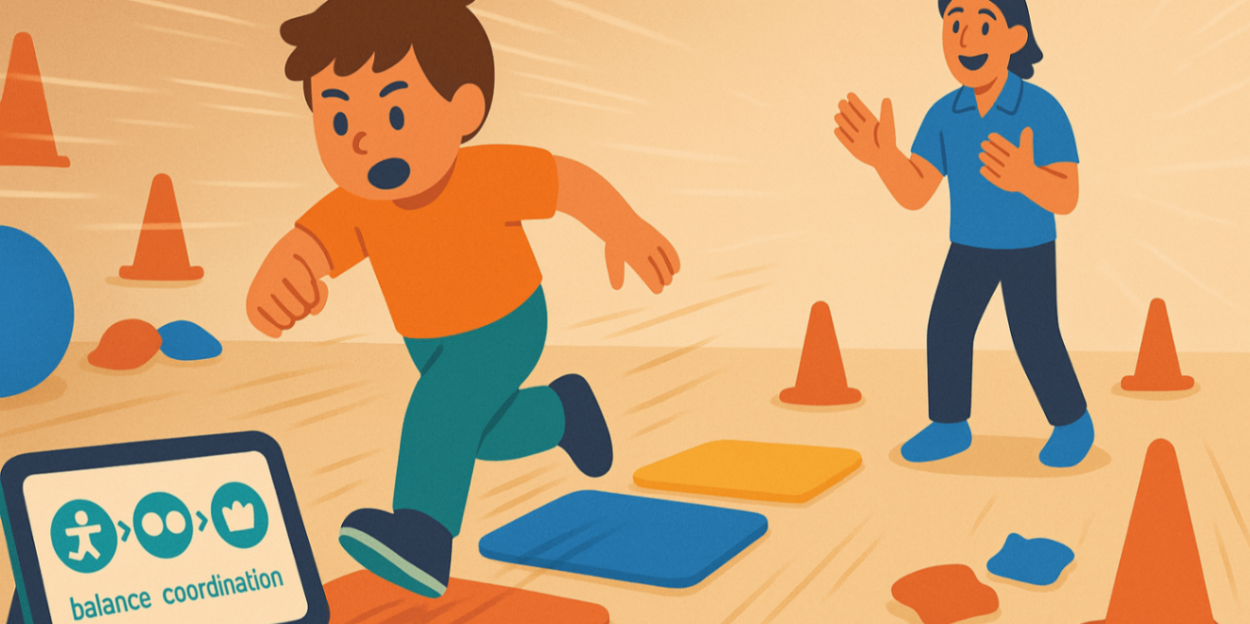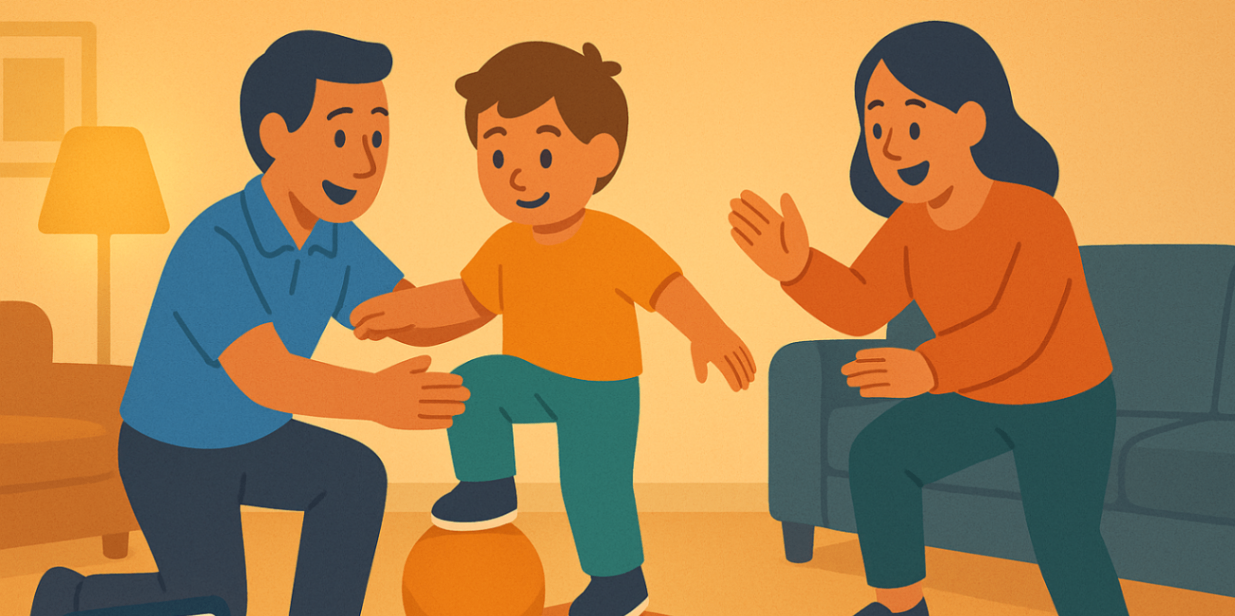
exercise physiology for children's motor skills
4 September, 2025
Introduction
Physical activity is essential for your child’s growing body and mind, contributing significantly to the development of children. But how do you ensure they are developing the key motor skills needed for a happy, active life? This is where children’s exercise physiology comes in. It provides a structured, science-based approach to movement that helps kids build crucial balance and coordination. A tailored program can empower your child to move with confidence, participate in play, and develop healthy habits that last a lifetime.
Key Highlights
-
A pediatric exercise physiologist designs tailored physical activity programs to improve a child's motor skills.
-
Specialised exercises help children build fundamental movement skills, balance, and coordination.
-
These programs are evidence-based and customised to support your child’s health and unique needs.
-
Goal-oriented physical activity can boost a child's confidence, social skills, and overall quality of life.
-
The primary goal is to foster a healthy, active lifestyle through enjoyable and achievable exercise.
-
Exercise physiology is an excellent tool for supporting children with developmental delays.
Foundations of Exercise Physiology in Children

Pediatric exercise physiology, or paediatric exercise physiology, is a specialised health field that uses physical activity to promote health and well-being in children. Unlike general fitness, it focuses on the science of how a child’s body responds to movement. An accredited exercise physiologist creates safe and effective exercise plans tailored to a child's specific age group, abilities, and goals. The aim is to improve the child’s health, manage or prevent chronic health conditions, and address issues like developmental delay.
The benefits for kids’ health and development are significant. These programs are designed to build muscle strength, improve cognitive skills, and help children overcome challenges linked to a sedentary lifestyle, addressing the negative outcomes of inactivity. By targeting specific muscle groups, an exercise physiologist helps a child enhance their motor skills in a fun, engaging way. This approach, often complementary to services from occupational therapists, makes physical activity an enjoyable and sustainable part of their life, fostering lifelong well-being.
Why Motor Skills Matter for Kids
Motor skills are the foundation of a child's physical abilities, allowing them to perform countless everyday activities with ease. From the gross motor skills needed for running and jumping to the fine motor skills required for writing and buttoning a shirt, these abilities are crucial for independence and participation.
Developing strong fundamental movement skills in early childhood directly impacts a child’s quality of life. Goal-oriented exercise helps improve these skills by breaking down complex movements into achievable steps. When kids can confidently navigate their physical world, they are better equipped to explore, learn, and reach their full potential.
Everyday Activities Requiring Motor Skills
You might be surprised by how many daily activities rely on well-developed basic motor skills. These movement skills are essential for everything from getting dressed in the morning to playing with friends at school. Without them, daily living can become frustrating for a child.
For example, simple tasks like using utensils to eat or tying shoelaces require precise fine motor skills. On a larger scale, playing on the playground, participating in sports, or even just walking up stairs safely depends on strong gross motor skills. Good ball skills, which combine hand-eye coordination and body control, are important for many popular games.
Many everyday movements depend on a combination of different skills. Some examples include:
-
Writing and drawing: Requires fine motor control and hand-eye coordination.
-
Climbing and jumping: Depends on gross motor strength and balance.
-
Catching a ball: Involves coordination, timing, and visual tracking.
-
Riding a bicycle: Needs balance, coordination, and core strength.
Impact on Academic, Social, and Emotional Growth
Improving motor skills does more than just help a child’s body; it also has a profound impact on their academic growth and cognitive development. When children are physically active, they can often focus better in the classroom, pay attention longer, and improve their problem-solving abilities. This connection between movement and the mind is a key part of their overall development.
Beyond academics, physical confidence is closely linked to better social skills. A child who feels capable on the playground is more likely to join in games, promoting social participation and teamwork. Group exercise settings provide a natural environment to practice communication, sharing, and cooperation, which are essential for building friendships.
Finally, physical activity is a powerful tool for emotional regulation and boosting overall health and mental health. Movement can help children manage stress and anxiety while releasing endorphins that improve their mood. As they master new physical challenges, their self-esteem grows, giving them the confidence to engage more fully in all aspects of life.
Role of Pediatric Exercise Physiologists

A pediatric exercise physiologist works alongside paediatric physiotherapists as an accredited health professional who specialises in creating exercise programs for children. Many hold a master’s degree and have in-depth knowledge of how a child’s body grows and responds to physical activity. They work with kids of all ages, from babies to teenagers.
These experts play a vital role in supporting children, especially those with developmental delays or other specific needs. They design and guide safe, effective, and fun therapy services that are tailored to each child's goals, enhancing the child’s ability to reach their full physical potential in a positive and encouraging environment. Now, let’s explore how they assess a child's needs and work with other professionals.
Assessment of Motor Development and Movement Patterns
The first step in any exercise physiology program is a thorough assessment of your child’s motor development. An exercise physiologist will start by discussing your child’s history, including any conditions like muscular dystrophy, your family’s goals, and any concerns you might have, such as signs of global developmental delay. This initial consultation is key to understanding your child's unique strengths and challenges.
Next, the professional will conduct a series of engaging tests to evaluate various movement skills. If you notice your child struggling with balance, coordination, or basic movements compared to their peers, an assessment can help identify if they might benefit from a program. These evaluations provide a baseline to create a safe and effective plan.
The information gathered from these assessments helps pinpoint specific areas for improvement. Regular monitoring ensures the program continues to meet your child’s needs as they progress.
|
Assessment Component |
What It Measures |
|---|---|
|
Gross Motor Skills |
Evaluates balance, coordination, running, jumping, and throwing to identify areas for improvement. |
|
Physical Capacity |
Assesses endurance, core strength, and posture to help reduce fatigue during daily activities. |
|
Functional Movement |
Observes everyday movements like walking, climbing stairs, and standing up from a chair. |
|
Strength & Flexibility |
Measures muscle strength and range of motion to address issues like low muscle tone or joint hypermobility. |
Collaborating with Families and Healthcare Teams
Effective support for a child often requires a team approach. A pediatric exercise physiologist is an important part of a collaborative healthcare team, working alongside families, occupational therapists, speech therapists, and psychologists to provide comprehensive care. This ensures that all aspects of your child’s needs are considered and addressed.
Collaboration is key to creating a unified exercise plan. The exercise physiologist focuses on improving fitness and participation through structured activities, while other professionals, like occupational therapy specialists and therapists, may focus on tasks related to daily living. By working together, the team ensures the therapy services are aligned and support the same goals.
Parents play a crucial role in this partnership. By understanding the exercise plan and reinforcing activities at home, you can make a significant difference in your child's progress. If you notice your child is not meeting developmental milestones, collaborating with a team of health professionals can provide the right support to meet your child's specific needs.
Types of Exercises to Enhance Balance and Coordination
 To improve balance and coordination, exercise programs for children include a variety of fun and engaging physical activity. These aren't just random games; they are carefully chosen to target specific movement skills and muscle groups. The goal is to make movement feel natural and enjoyable.
To improve balance and coordination, exercise programs for children include a variety of fun and engaging physical activity. These aren't just random games; they are carefully chosen to target specific movement skills and muscle groups. The goal is to make movement feel natural and enjoyable.
From simple strength training exercises to dynamic drills that challenge their stability, these activities help children gain better control over their bodies. A well-rounded program will incorporate different types of exercises to build a solid foundation for all physical skills. Let’s look at some examples suitable for different ages and abilities.
Age-Appropriate Activities for Babies, Children, and Teens
Customising activities for each age group is essential for effective motor skill development. For babies, exercise interventions are gentle and focus on building foundational strength. These simple movements are the first step in learning body control.
As children grow, their exercise programs become more structured but remain play-based, benefiting people of all ages. Fun games and simple movement tasks help boost basic motor skills and make physical activity a positive experience. For teens, sessions can be more goal-oriented, focusing on building physical capacity or supporting participation in sports and other daily activities.
Exercise physiology programs are designed to be suitable for every age, from babies to teens. Here are some examples:
-
Babies: Tummy time and sensory play to build neck and core strength.
-
Young Children: Fun games that involve running, jumping, and throwing.
-
Teens: Structured exercise interventions focusing on strength, endurance, and sport-specific skills.
-
All Ages: Activities that can be adapted, like obstacle courses or dancing.
Strength, Flexibility, and Coordination Drills
A well-designed exercise program includes specific drills to build strength, flexibility, and coordination. These elements work together to improve a child's overall physical ability. Strength training, when properly supervised, is safe for children and is crucial for developing muscle endurance and supporting joints.
Improving flexibility helps increase a child's range of motion, which can prevent injuries and make movements smoother. Drills that focus on coordination help the brain and muscles work together efficiently, which is key for complex tasks like catching a ball or riding a bike. Building core strength is also a major focus, as it is the foundation for good posture and stable movement.
Here are some drills that might be included in a program:
-
Strength: Bodyweight exercises like squats and planks to build core strength.
-
Flexibility: Gentle stretches to improve range of motion.
-
Coordination: Activities like jumping jacks, skipping, or balancing on one leg.
-
Endurance: Fun games like tag to improve cardiovascular health.
Conclusion
In conclusion, children’s exercise physiology plays a vital role in building motor skills, balance, and coordination—especially for those experiencing gross motor delays. These physical foundations don’t just support strength and movement; they also influence academic readiness, confidence, and social participation.
With the right age-appropriate exercises and guidance from qualified paediatric exercise physiologists, your child can develop the skills they need to thrive in everyday life—whether that’s in the classroom, on the playground, or in sports. Professional support ensures assessments are accurate, programs are tailored, and progress is carefully monitored in collaboration with families.
Ready to give your child the best start in movement and development? Book your consultation today and discover how tailored exercise programs can help your child reach their full potential.
Frequently Asked Questions
Is exercise physiology safe for young children?
Yes, exercise physiology is very safe for young children when guided by a qualified pediatric exercise physiologist. They design programs with your child’s health and safety as the top priority, especially for children managing chronic health conditions. All activities are tailored to the child's age and ability.
How do I know if my child would benefit from an exercise physiology program?
If you notice your child struggling with motor skills, has a developmental delay, or seems less coordinated than their peers, they might benefit from an exercise program. The best first step is to seek an assessment from qualified health professionals who can evaluate your child’s needs and recommend appropriate support.
What is the difference between a pediatric physiotherapist and a pediatric exercise physiologist?
A pediatric exercise physiologist uses planned physical activity and exercise as the primary form of therapy to improve health and function. In contrast, a pediatric physiotherapist often focuses on diagnosis and treatment of injuries or conditions, sometimes using more hands-on manual therapy techniques as part of their therapy services.
.svg)

















